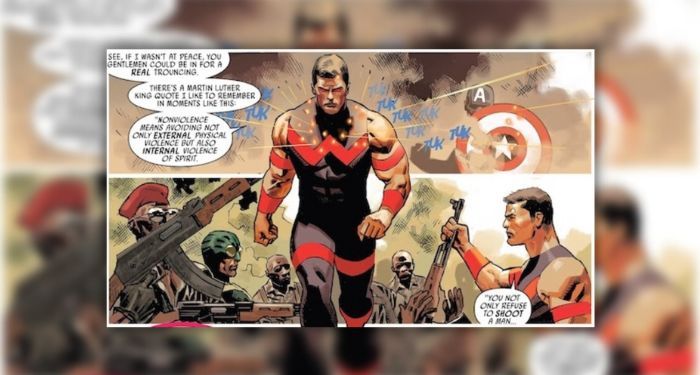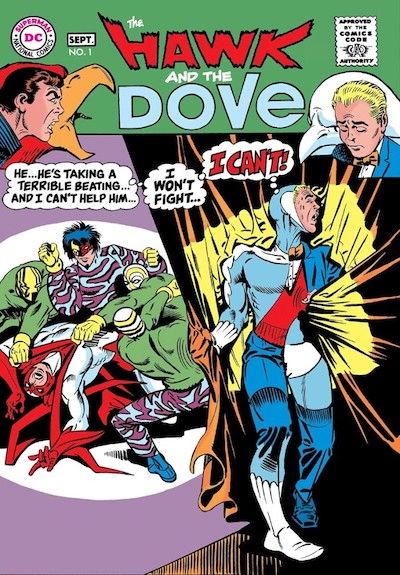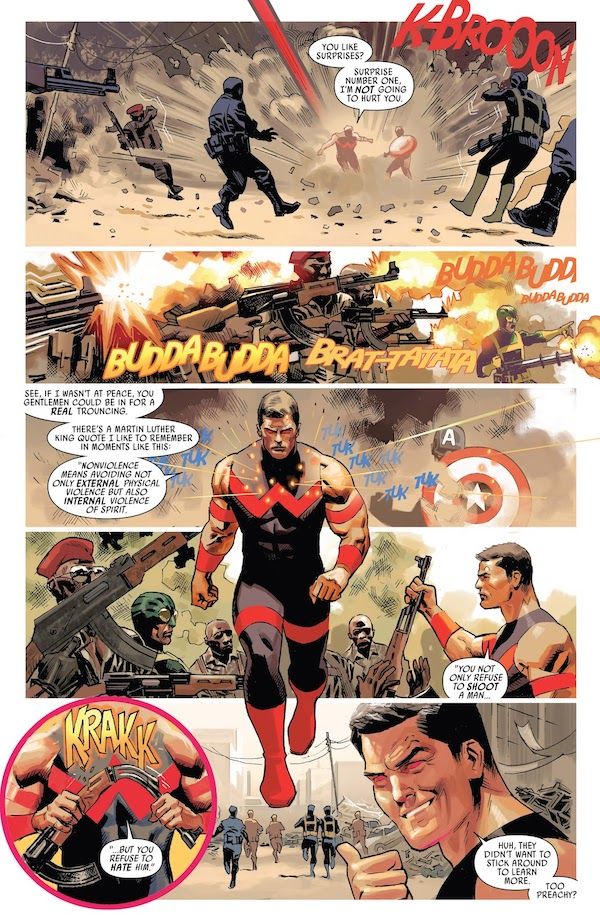
Give Peace(ful Superheroes) a Chance: Pacifism in Superhero Comics
Recently, I took a deep dive into Hawk and Dove comics from DC. The original Hawk and Dove were created in 1968 by Steve Skeates and Steve Ditko, and various other permutations of the characters have hung around the DCU ever since — never marquee characters, but solid second stringers. They were even regulars on the TV show Titans.
As you might imagine from their codenames or that 1968 debut year, there was a political subtext to Hawk and Dove as they were originally conceived. Brothers Hank and Don Hall are total opposites: Hank is a violent, impulsive hothead, and Don is a thoughtful, anxious pacifist. When a mysterious voice grants them superpowers, they are suddenly given the opportunity to see whose approach to problem-solving is best: Hawk’s warlike aggression or Dove’s peaceful de-escalation.

I could not care less about Hank Hall, who is a dangerously bullheaded jerk, but the concept behind Don fascinated me. Superhero comics are typically slugfests, and yet here was a superhero book starring an actual pacifist — a hero who had sworn never to raise a fist in anger. How could DC tell stories about such a character?
The answer is: not very well. Don typically spends every issue fretting over whether or not he can adhere to his nonviolent principles in the face of danger, then wrings his hands while Hank beats everyone up. He also seems to have a bizarre definition of nonviolence: he’s perfectly comfortable pushing, kicking, or restraining opponents, as long as he doesn’t punch them or use a weapon. As the embodiment of a philosophy, he’s not particularly coherent.
He also didn’t have many appearances. Hawk and Dove was canceled after six issues, after which the boys briefly joined the Teen Titans before quietly disappearing from that book, too. Don was eventually killed off in 1985’s Crisis on Infinite Earths. A new Hawk and Dove book was launched with a new Dove, Dawn Granger, and a new mythology established that she and Hank represented not peace and war, respectively, but order and chaos. (You know how doves are such, uh, orderly birds.) Dawn has absolutely zero problems with punching bad guys. The notion of a DC superhero standing solely for peace died with Don Hall.
But it got me thinking: are there any other superheroes who are committed to pacifism? I don’t mean someone like Superman, who would love it if we all just got along but will heat vision your ass without hesitation if you try to conquer Earth, Zod. I mean heroes who see not fighting as a principled stand — who treat pacifism as an ideology and not just the preferred option.
The pickings are unsurprisingly slim. The joke answer here is DC’s Peacemaker, whose slogan since the ’60s (when he was owned by the company that originally created him, Charlton Comics) is “A Man Who Loves Peace So Much That He Is Willing To Fight For It!” Now, there are obviously many ways to metaphorically fight for peace without actual violence, but considering that Peacemaker carries a gun, I don’t think that’s what Charlton meant. Modern versions of the character have made plenty of comedy hay out of the contradiction, especially the live-action version played by John Cena.
There’s a popular quote by Wonder Woman that often makes the rounds on the internet, from Gail Simone’s run on the character: “We have a saying, my people. ‘Don’t kill if you can wound, don’t wound if you can subdue, don’t subdue if you can pacify, and don’t raise your hand at all until you’ve first extended it.’” And certainly, Wonder Woman, as first conceived by William Moulton Marston, was a character who preferred to use love (and specifically loving submission, thanks to Marston’s convoluted theories about psychology, feminism, and BDSM) to change people’s minds rather than hate or aggression. But she also came to man’s world specifically to kick Nazi butt. And modern interpretations of the character, particularly those by men, tend to emphasize the warrior aspect of the character above all. Wonder Woman, like Superman, is a character who would prefer peace but is perfectly willing to meet violence in kind.
Then there’s the trope of the enlightened martial artist who hates fighting but is better at it than everyone else (which, of course, isn’t just limited to superhero comics). Marvel’s Shang Chi is probably the best embodiment of this. He turns his back on his megalomaniacal father’s evil empire once he learns the truth about it, and basically, every issue of his ’70s solo series has him being suddenly attacked by ninjas while lamenting that once more, he is forced to use violence. But he still never chooses not to use it. I guess you can’t really have a character star in a book called Master of Kung Fu during the height of the kung fu craze and not have him do kung fu. (Silver Surfer, it could be argued, is sort of a cosmic take on this trope.)
One character who is superb at nonviolent de-escalation is Squirrel Girl, at least since 2015. Under Ryan North’s pen, The Unbeatable Squirrel Girl was a comedy that often drew its humor from subverting expectations. As the title suggests, Squirrel Girl canonically has the power to defeat anyone, so a confrontation with, say, Galactus (a being so large and terrifying he can eat planets) is simply funnier if the two of them wind up just hanging out in space and chatting instead. Throughout her series, Doreen often stopped before launching into a fight and simply asked the villain what they wanted, then worked hard to find a resolution that benefited everyone. I do genuinely think that Squirrel Girl’s creative and collaborative approach to conflict resolution makes it arguably the most groundbreaking superhero comic in literal decades. But she did also star in a book (also written by North) called The Unbeatable Squirrel Girl Beats Up the Marvel Universe, so, you know…baby steps.
But while researching this question, I did come across one absolute pacifist superhero: Wonder Man. Wonder Man (Simon Williams) was originally an Avengers villain, although he was quickly redeemed and ultimately joined the team (after a little death and resurrection, because comics). Eventually, he came to disagree with the Avengers, feeling that their violent pursuit of justice caused more harm than good, although his opposition to the Avengers’ violence often involved…uh, fighting them. Even when he wasn’t swinging his fists, he was mostly portrayed during this era as misguided at best and often as an adversary. It was not exactly a sympathetic depiction of his perspective.

Finally, in 2012, Simon declared that he was “done punching things as a solution.” I’ll be honest: I’m not well up enough on my Wonder Man to know if he has consistently maintained his nonviolent stance under every single writer who has tackled him in the decade since. But from what I can tell, he seems to have stuck to his, um, lack of guns, up to taking a beating from Ares because of his refusal to fight him in one-on-one combat.
Simon’s position raises the same questions for me that Don Hall’s position did 44 years prior. Is nonviolence a luxury reserved for superheroes who happen to be bulletproof? Is it enough to eschew violence personally while working closely with other superheroes who are constantly fighting? If your pacifist hero is usually working with a partner or a team, how do they resolve problems when they’re on their own and can’t rely on Hawk or Captain America to do the punching?
And, most importantly, if Don and Simon are right that violence only causes further violence, what does that mean for every other superhero?
I don’t have the answers to these questions. I don’t know that there are answers, just as there aren’t easy answers in the real world. But they are fascinating questions to raise, especially in a genre that relies so heavily on violence as justice. Don is long dead, and Wonder Man is hardly an A-lister, so they haven’t been given a lot of scope to explore the ethics of violence vs. pacifism. It’s possible the upcoming Wonder Man show starring Yahya Abdul-Mateen II will explore these ideas, although given that it’s been billed as a “Hollywood satire” focusing on Simon’s time as a stuntman, that seems unlikely.
Still, I’ll keep hoping for more pacifism in superhero comics. Don’t get me wrong: I like a good fight scene as much as any other comics fan! I just think pacifism adds an interesting angle to the debate.
In other words, all I am saying is give peace(ful superheroes) a chance.









